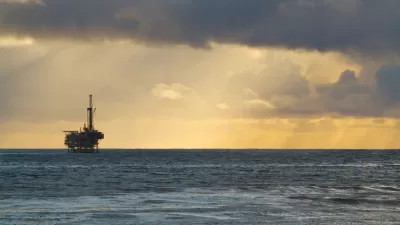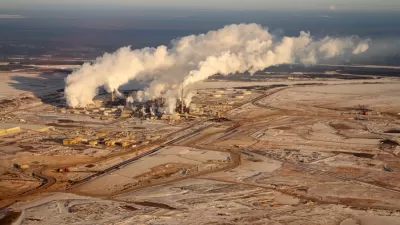Shell Oil's seven-year, $4 billion investment has paid off. Awaiting final Interior Dept. permits, two drilling ships, moored in Seattle, are poised to travel to the Arctic to begin drilling test wells in 150 ft of water off northern Alaska in July.
In this feature article, John M. Broder and Clifford Krauss look at the conditions, including the legacy of the Exxon Valdez disaster in 1989, that led to Shell Oil's successful pursuit of the right to drill in the fragile Arctic waters. Shell took a different political course than its Big Oil brethren as it set about wooing potential adversaries by "pushing for a strong response to climate changes."
Its biggest obstacle proved not to be President Obama, "under pressure from rising gas prices" nor the mainstream environmental organizations who remain opposed to the effort.
"Frances Beinecke, president of the Natural Resources Defense Council and a member of the National Commission on the Deepwater Horizon Oil Spill and Offshore Drilling characterized the exploration as "a reckless gamble we cannot afford."
The 5,000 Inupiat Eskimos who see the drilling as a threat to their whale-based culture, and their leader, North Slope Borough Mayor Edward S. Itta whose "gravitas grew from his acclaim as one of the area's finest whaling captains", proved to be the greatest obstacle. As Broder writes in his Green blog, these Eskimos are the ones most likely to suffer should there be an oil spill.
"Shell company executives say (the Arctic) could eventually yield a million barrels a day of crude - or more than 10 percent of current domestic output." [U.S. Crude oil plus petroleum products of 8.5 mb/day + natural gas liquids of 2 mb/day.]
As possibly an omen of the difficulties in drilling in the Arctic that await Shell, "the heaviest polar ice in more than a decade is clinging to the northern coast of Alaska could postpone the commencement of offshore oil drilling until the beginning of August", reports the LA Times.
FULL STORY: New and Frozen Frontier Awaits Offshore Oil Drilling

Alabama: Trump Terminates Settlements for Black Communities Harmed By Raw Sewage
Trump deemed the landmark civil rights agreement “illegal DEI and environmental justice policy.”

Study: Maui’s Plan to Convert Vacation Rentals to Long-Term Housing Could Cause Nearly $1 Billion Economic Loss
The plan would reduce visitor accommodation by 25% resulting in 1,900 jobs lost.

Planetizen Federal Action Tracker
A weekly monitor of how Trump’s orders and actions are impacting planners and planning in America.

Wind Energy on the Rise Despite Federal Policy Reversal
The Trump administration is revoking federal support for renewable energy, but demand for new projects continues unabated.

Passengers Flock to Caltrain After Electrification
The new electric trains are running faster and more reliably, leading to strong ridership growth on the Bay Area rail system.

Texas Churches Rally Behind ‘Yes in God’s Back Yard’ Legislation
Religious leaders want the state to reduce zoning regulations to streamline leasing church-owned land to housing developers.
Urban Design for Planners 1: Software Tools
This six-course series explores essential urban design concepts using open source software and equips planners with the tools they need to participate fully in the urban design process.
Planning for Universal Design
Learn the tools for implementing Universal Design in planning regulations.
Caltrans
Smith Gee Studio
Institute for Housing and Urban Development Studies (IHS)
City of Grandview
Harvard GSD Executive Education
Toledo-Lucas County Plan Commissions
Salt Lake City
NYU Wagner Graduate School of Public Service




























